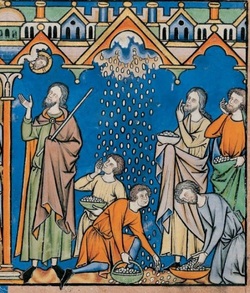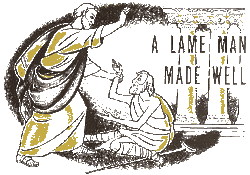
Just click to download it in Word format! Have fun!
/uploads/1/7/6/9/17696165/trinity_summer_2014_bible_reading_plans_.docx
| Steve Squires |
|
 Here is a link to a great Bible reading plan given out in church a few weeks ago. It gives you a bunch of different options for reaching - all lasting about two weeks. It's about 5-10min of reading each day, so it's very manageable. Just click to download it in Word format! Have fun! /uploads/1/7/6/9/17696165/trinity_summer_2014_bible_reading_plans_.docx
0 Comments
 There have been times in my life that I have wondered how God could be so faithful to me while I actively disobey His Word. A great example of this is found in Numbers 11 (click HERE to read the chapter). In this story the Israelites are complaining to God that they have nothing to eat - even saying that they were better off in Egypt as slaves! They were complaining that God was not giving them enough. God's answer was to give them manna. The Israelites continued to complain that they did not have meat to eat - again, saying they were better off in Egypt. Once again, God gives them their meat - so much that they learned not to complain! While this drama continues to unfold, God continues to take care of the Israelites by providing them with great leadership. God blesses 70 of Israel's elders to send His Spirit to in order to prophesy and "help (you) carry the burden of the people so you (Moses) won't have to carry it alone" (vs. 17). Despite Israel's rebellion, God makes sure she has proper leadership to lead her out of Sinai. There is a short lesson here: God provides for His people despite their own rebellion. For us today, we can know that as we struggle with sin God will still sustain us - even in our worst days. If you are in your worst day - take heart, trust God to provide for you. The provision is not for your glory or because you are doing anything right, it is for His glory because of  This is Jeremiah's cry to God concerning the rebellion of Judah and Jerusalem. God has the same concern for the nations today. My soul, my soul! I am in anguish! Oh, my heart! My heart is pounding in me; I cannot be silent, Because you have heard, O my soul, The sound of the trumpet, The alarm of war. 20 Disaster on disaster is proclaimed, For the whole land is devastated; Suddenly my tents are devastated, My curtains in an instant. 21 How long must I see the standard And hear the sound of the trumpet? 22 “For My people are foolish, They know Me not; They are stupid children And have no understanding. They are shrewd to do evil, But to do good they do not know.”  The Elders at our church have been reading through a book called "Multipy" by Francis Chan (click HERE to buy the book). The book is a primer for both understanding the importance of growing disciples as well as how to go about taking steps to grow a disciple. Currently we are reading a chapter called "Why Study the Bible" and it has an interesting quote that I thought I would list here: "If we really believe that the Bible is the Word of God, then it should be much more than a book that we are familiar with. It out to shape every aspect of our existence. It should guide the decisions we make in life" (92). I think that most people fall into the former category - the Bible is nice and all, but does it really impact lives at a visceral level. True transformation only occurs when we allow the Scriptures to speak to our lives in every situation. Example: The Great Commandment calls us to love our neighbor as ourselves. When we read the Scripture and don't do anything about it, there is no transformation there - the Bible calls us to ACTIVELY find ways to love our neighbor: bringing coffee over, helping to shovel the driveway. Acting on the commandments of Christ is the greatest sign that we are being transformed and not just existing. Are you in existence mode or are you being transformed?  Lately I have been thinking a lot about difficulties; not the small difficulties, like the interminable time spend at the DMV, but difficulties that shake you to the core: health problems, financial problems, etc. I have noticed that we spend a lot of our time reacting to difficulties, perhaps most of our time. The ubiquitous nature of difficulties or trials begs us to ask the question - "what is the meaning of all of this?" or "what is going to come of all this?" The Bible speaks to this idea of going through trials and what we can expect when we are going through and come through the other side: 2 Consider it pure joy, my brothers and sisters, whenever you face trials of many kinds,3 because you know that the testing of your faith produces perseverance. 4 Let perseverance finish its work so that you may be mature and complete, not lacking anything. James here gives us an encouragement that goes something like this: " find some solace in your trials because you will have something come from them, you will grow in faith and learn how to persevere through trials that will come." Trials are training. Even though God doesn't cause all of your trials, He can use them to strengthen you for other conditions in your life. We have a tendency (understandably so) to try to avoid trials, but sometimes they are imposed on us. We can do two things at once: ask God to take the trial away from us and also ask for courage to go through the trial and learn something from it. It's not one or the other, it's  What makes you do something? What forces a reaction out of you? Let me ask you a more pointed question - what makes you passionate? In our lives as Christians (I'm generally speaking to one who has Christ as their Lord and Savior) we are motivated and passionate about something, but I'm wondering how many of us are passionate and motivated by what Christ has done in our lives! The below incident of Jesus' healing addresses the question: Luke 17:11-19 11 Now on his way to Jerusalem, Jesus traveled along the border between Samaria and Galilee.12 As he was going into a village, ten men who had leprosy met him. They stood at a distance 13 and called out in a loud voice, “Jesus, Master, have pity on us!” 14 When he saw them, he said, “Go, show yourselves to the priests.” And as they went, they were cleansed. 15 One of them, when he saw he was healed, came back, praising God in a loud voice. 16 He threw himself at Jesus’ feet and thanked him—and he was a Samaritan. 17 Jesus asked, “Were not all ten cleansed? Where are the other nine? 18 Has no one returned to give praise to God except this foreigner?” 19 Then he said to him, “Rise and go; your faith has made you well.” When Christ heals you, shows up big in your life, and/or answers a prayer do you figuratively thank Him and allow that healing to stoke your passion for what He is doing in the world. Alternatively, is thanking Christ and being passionate about what He has done in your life the last thing you think about; you are one of the nine who turned away and never said "thank you." My challenge to you is to let what God has done in your life turn into passion for Christ and for His church. What Christ has done in your life should put the focus back on Him and give Him glory! Be passionate about what He has done and let it motivate your to change a life!  Luke 7:40-50New International Version (NIV) 40 Jesus answered him, “Simon, I have something to tell you.” “Tell me, teacher,” he said. 41 “Two people owed money to a certain moneylender. One owed him five hundred denarii,[a]and the other fifty. 42 Neither of them had the money to pay him back, so he forgave the debts of both. Now which of them will love him more?” 43 Simon replied, “I suppose the one who had the bigger debt forgiven.” “You have judged correctly,” Jesus said. 44 Then he turned toward the woman and said to Simon, “Do you see this woman? I came into your house. You did not give me any water for my feet, but she wet my feet with her tears and wiped them with her hair. 45 You did not give me a kiss, but this woman, from the time I entered, has not stopped kissing my feet. 46 You did not put oil on my head, but she has poured perfume on my feet. 47 Therefore, I tell you, her many sins have been forgiven—as her great love has shown. But whoever has been forgiven little loves little.” 48 Then Jesus said to her, “Your sins are forgiven.” 49 The other guests began to say among themselves, “Who is this who even forgives sins?” 50 Jesus said to the woman, “Your faith has saved you; go in peace.” I follow a lot of blogs on ministry, church, theology, etc. One that I follow is by a guy named Ron Edmondson (http://www.ronedmondson.com/). He has a lot of advice for pastors and church members alike. He recently wrote an article on how Christians should behave online. Here are his main points:
No soapbox -We are told to “do everything without arguing or complaining.” (Philippians 2:14) That doesn’t mean we can’t support causes we believe in, but they should be moral and Biblical issues, not personal agendas. No public bashing – Unless you’ve practiced Matthew 18 principles, and even then it would be rare, don’t address your problems with others online. It’s not helpful and never promotes peace. (Romans 12:18, Hebrews 12:14) No little jabs – We shouldn’t say things about others that may be misinterpreted as a stab against them. Guard your online tongue. (James 3). I see this especially as a passive aggressive tactic. We feel “safe” evoking insults or cuts to another person online that we would never say to their face. Encouragement – Social media can be a great way to encourage others. We shouldn’t spam with massive amounts of posts. Few appreciate the person who reshares everything they see, but most everyone likes to read an encouraging word pointed especially to them. (Ephesians 4:29) Do to others – As we’d have them do to us. We should always think before we post. Pause. Breathe. Think. Post. Ask yourself how you would be impacted by the post before you post it. (Luke 6:31) Guard against pride – We have to be careful with self-promotion and bragging about ourselves online. Granted, this is coming from one who has built an online platform online and I frequently encourage other pastors to do the same. It’s one of the best ways currently to engage people for Kingdom building. But, this is a reminder for me too. We must check our motives, guard our hearts and never allow our egos to rob glory from what God wants to do through our online presence. (Proverbs 11:2, 13:10) Not allow it to be a replacement for community – It’s easy to post “Happy birthday” or reply “Praying for you” without really doing so. We shouldn’t trade the functions of the Body for an online presence. (Acts 2:42-47, Hebrews 10:24) So as you are using Facebook, Twitter, email, blogs, etc. keep in mind that you are a Christian first and in everything you do, you represent the KIngd Currently I'm reading a book by Steve Turner called Popcultured. The book is designed to help Christians navigate the postmodern pop culture pathways. One paragraph that I found particularly helpful for the Christian consumer of pop culture came in the chapter "Celebrity Culture,"
"So how should we approach celebrity as Christians? We need to maintain our perspective. Because someone can write memorable songs, tell gripping stories or design wonderful clothes doesn't mean they are worthy of reverence or deference. We can respect someone who has a basic gift that they have subsequently developed, but we shouldn't glorify them as though they had invented the gift it self . . . it came directly from God" (105). Good stuff. Keep perspective and remember to keep the main thing, the main thing. I've had Keeping in Step with the Spirit by J.I. Packer on my shelf for quite some time. Every time I walk past the book I say, "yes, I will get to that!" Well, I've finally got to it. The purpose of Packer's book is to raise awareness of the presence and work of the Holy Spirit in the spiritual formation of Christians. Without getting into too much detail (this is not a book review), I wanted to focus in on a quote which I think is helpful in understanding the Spirit's role of making Christians aware of sin - a definition of sin itself. The word and even concept of sinfulness is used quite a lot, but I struggle with a precise definition (I would even go as far to say that in our cultural setting we need a new more relevant description that people can understanding). All that being said, I think Packer provides us (me) with a helpful definition,
"Sin, which is in essence an irrational energy of rebellion against God - a lawless habit of self-willed arrogance, moral, and spiritual, expressing itself in egoism of all sorts . . . " (34). |
AuthorsFather, Pastor, Writer Archives
January 2023
Categories
All
|